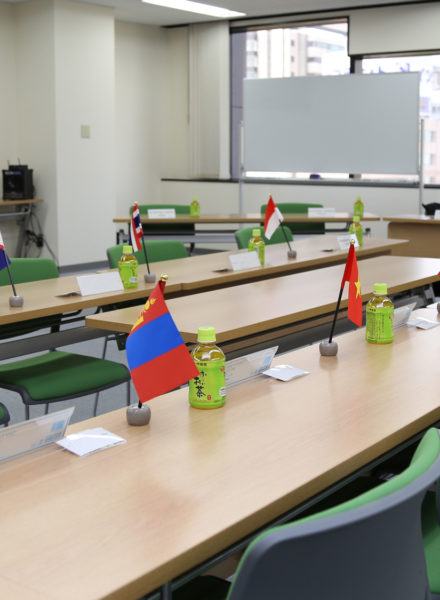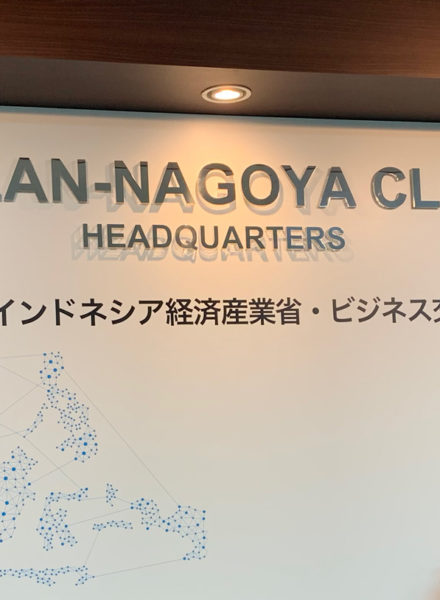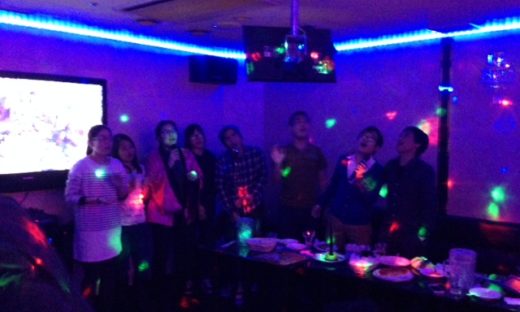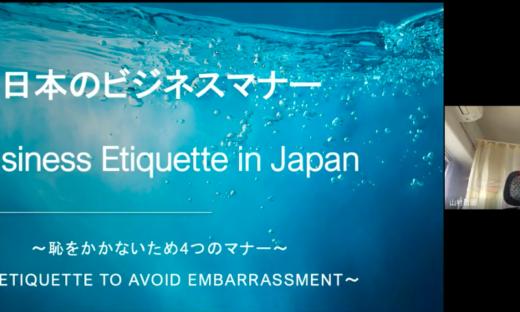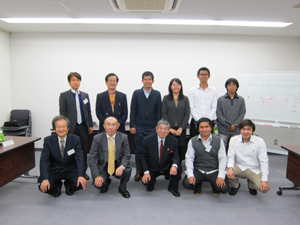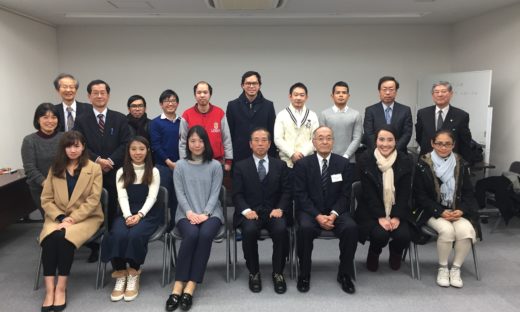第12回ミーティング報告書 2015年7月30日 (The 12th Meeting Report July 30, 2015)
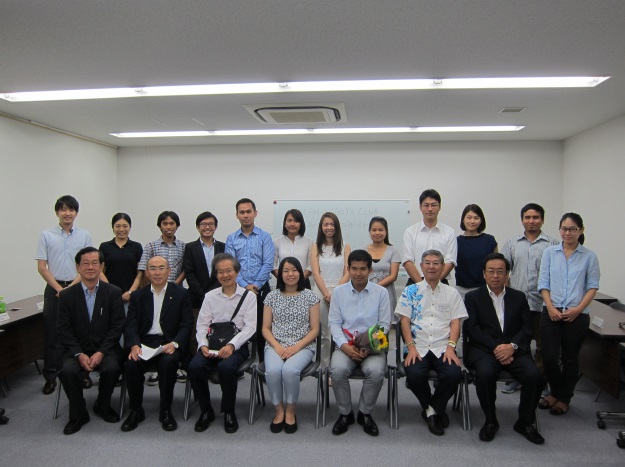
集団主義と個人主義
ASEAN-NAGOYA CLUBは、1年を迎えました。名古屋大学のOBが集まり、次の世代にバトンを渡す。国際関係とは、とりもなおさず国際的な人間関係。相互信頼のない国際関係は脆弱なものです。OBは長年の海外活動を通じて、国際的な人間関係の重要性を肌で感じています。現役時代には本社、日本本社の意向で動かざるをえないことが多いものです。しっかりした人間関係の上にビジネスをやらざるを得なかった面に悔いが残っている方が多いものです。そうした反省の上に、現役時代に果たせなかった真の相互交流を実現したいと思うのです。
OBに出来ることは何か。それは、海外からはるばる遠い日本に来ている留学生に、日本の真の姿を伝えることではないのか。学問だけを学び母国に帰る。日本に留学し、学位だけを携えて帰国する。宿舎と大学を往復し、それ以外の日本を知らずに帰っていく。そんな留学生が多いものです。
彼らが、将来、母国の要職についたときに、日本に留学経験があるというだけで”知日派”として活躍するに違いありません。しかし、日本人が一体何を考え、ものごとをどのように捉えるのかを知らず、また信頼できる日本人の友人をもつことのない、”知日派”になる可能性があります。
真の日本は何か。日本人の思考様式はどのようなものか。率直に意見交換のできる関係を通じて、日本を理解する。深い理解を持たない留学生、そんな溝を埋めよう。OBが目指したものは真の知日派を育てる。今後、急速に力を付けていくASEANの留学生の皆さんにそのような機会を提供したい。そんな思いでスタートしました。
1年を経過し、少しずつではありますが、その方向に向かっているのではないかと思います。日本の次の世代とアセアンの留学生の架け橋を目指したいと思います。
ASEAN-NAGOYA CLUB 1周年の総括をしてみました。
【 成 果 】
1)日本人及び日本社会の表層を通り過ぎて、帰国する留学生が多い中、月一回の勉強会および、食事会を通じて、参加留学生は、日本人の深層に少し触れることができたのではないか。
2)ASEAN留学生同士の交流の場としても機能している。
3)OBの心からなる精神的支援を通じて、日本社会に対する一定のポジティブな見方を提供できたのではないか。
4)日本社会の優れたところ、課題、両面を客観的に議論しあうことで、真の知日派が育ちつつあるのではないか。
【 課 題 】
1)意見交換の質を確保する、規模拡大を図りながら、意見交換の質を確保するために、どう考えるか。
2)ASEAN参加10カ国の機会均等の実現。
3)日本人学生の参加交流。
4)ASEAN CLUB参加者、帰国後の継続的な支援の実現。
5)帰国留学生に伴う、後輩留学生の推奨。
【月例ミーティング】
総括会議を終了し、月例のミーティングを開催しました。
7月のテーマは、「集団主義と個人主義」についてです。日本人は集団主義ではないか。留学生から次のような疑問が投げかけられました。「日本人は、集団主義的で、欧米人は個人主義だとよく言われています。例えば、日本人は自分よりも、まず会社のために一生懸命働くという話がよくあります。問題があっても、あまり社長に対抗しないと言われています。そのため、ストライキなどは、日本にあまりありません。これに対して、欧米人は国家や会社に対して、常に自分の権利をよく主張します。その一例がフランス人です。フランス人は、もし会社が自分の希望に対して応えられなかった場合、よくストライキをしていると言われています。実際に、2014年に、エールフランスのパイロットたちが同社傘下の格安航空会社のサービス拡大に抗議して、ストライキに突入して、運航便の半数以上に影響が出てた」ということです。日本人はそのような光景がないように見えるというのです。
私たち日本人の中にも、自分たちは集団主義的な国民性だと思う人も多いようです。しかし、裏づけを確認したり、話し合ったりする場はあまりありません。日本人にとっても理解を深めるよい機会となりました。
日本人OBから見た集団主義に対するコメントは以下のようなものでした。
ある集団をつくり、団体の協調性を高めていくために、和を重んじるという点では、集団主義といえるかもしれない。すなわち、団体を構成すれば、構成員の権利を主張する前に、団体の協調性を重視するという点は、欧米の価値観とは異なるかもしれません。一つの例として、企業と組合の関係について話しが出ました。そもそも組合は企業に対抗する存在です。しかし、海外から取り入れられた組合という概念が、日本的に変容していきました。御用組合などという言葉があるように、組合と企業が協調的に動く場合があります。組合の委員長経験者が、経営者になるという構造は日本的な現象です。対立を乗り越え、企業と組合が、共存するあり方を探るという思考は日本人に強いともいえます。一見、集団主義的な国民性が浮かび上がってくるのです。
しかし、異論も出ました。1960年代の高度成長を経験したOBからは、当時は脇目も振らず仕事をこなさなければ追いつかず、家族をも犠牲にしなければならないほど、全ての日本企業は忙しかったのが実態だったという指摘がありました。集団主義的に会社への忠誠心のために、勤勉であったというわけではないとの意見でした。また当時は、毎年給料が上がっていくという大きなインセンティブが作用していました。
さらに時代が下り、集団主義的に見えるその光景も随分変わってきたという議論が交わされました。低成長時代を経て、バブルが崩壊してからというものは、今日、給料上昇のインセンティブはなくなり、年功序列も崩れ、企業への忠誠心、集団主義という要素は年々、薄れている現実があります。
たとえ集団主義という印象を受けることがあっても、すでに、他国に比して明らかな違いがあるというものではないようです。
【送別会】 カンボジアのChanlinoさんが、修士課程を修了し、帰国することになりました。Chanlinoさんは、この1年の出席で、学問以外の日本文化、思考様式について多くを学ばれました。留学前は国連に務める弁護士さんでしたが、この1年間の留学経験はChanlinoさんの人生を大きく変えたようです。帰国後、弁護士事務所を立ち上げ、カンボジアと日本の架け橋を手がける夢をもつことになりました。
ASEAN-NAGOYA CLUBで最も勉強になったことは、勉強会の後の食事会だったそうです。自分の本音で、日本人及び他国の留学生と話し合うことがChanlinoさんの財産になったようです。母国の発展ために御活躍をお祈りしています。
Collectivism and Individualism
ASEAN-NAGOYA CLUB has celebrated its first year. OBs (alumni) from Nagoya University gathered and passed the baton to the next generation. International cooperation without mutual trust is vulnerable. Through many years of overseas activities, OB has realized the importance of international relationships. Heart-to-heart contacts through cultural exchange between various nations will correct misunderstandings and prejudices which tend to arise in international relations, and have an incalculable meaning in eliminating such distrust and suspicion.
There has to be mutual understanding and make particular efforts toward entering into various types of exchange with foreign countries in social and cultural fields to strengthen the relationships among countries.
Generally, international students come all the way to Japan only to study, their activities and mobility only go back and forth between campus and dormitory. They do not have much time and opportunity to explore more knowledge about Japan, including its culture and society. Therefore, it is necessary to introduce Japanese society to them, not only making it easier for them to adapt to the environment, this is necessary for their knowledge when they return to their home country.
When they get a key position in their home country in the future, they must be active as “Pro-Japanese group” just because they have studied abroad in Japan. However, there is a possibility of becoming a “Pro-Japanese” who does not know what the Japanese think and how they perceive things, and who do not have reliable Japanese friends.
The international students need to know the Japanese way of thinking, and how to understand Japanese. For international students who do not have a deep understanding, ASEAN-NAGOYA CLUB attempts to fill that gap and becomes a bridge between international students and Japanese society in creating mutual understanding.
[Results]
1) While many international students return to their respective countries after completing their studies in Japan and have a lot of experience in life in Japan, the participating international students can dig more in depths of the Japanese people through monthly study sessions and dinner parties.
2) ASEAN-NAGOYA CLUB also has a function as a place for exchanges among ASEAN international students.
3) we thought that we were able to provide a certain positive view of Japanese society through the support of the OB.
4) The topics of discussions are broader by objectively discussing the advantages, issues, and Japanese society.
1) Ensuring the quality of the opinions.
2) Realization of equal opportunity for the 10 ASEAN participating countries.
3) Participation in exchange of Japanese students and International Students.
4) ASEAN-NAGOYA CLUB participants, realization of continuous support after returning home from Japan.
We finished the general meeting and held a monthly meeting.
The theme for July session is “collectivism and individualism”. Is Japanese collectivist? The following questions were asked by international students. “It is often said that the Japanese are collectivists and the Westerners are individualist. For example, it is often said that the Japanese work harder for the company than they do for themselves. Therefore, there are not many strikes in Japan. On the other hand, Westerners always insist on their rights to the nation and the company. One example is the French. French are said to be often on strike if the company fails to meet their wishes. In fact, in 2014, Yale France pilots protested the expansion of services of cheap airlines under the company, the company rushed into a strike, affecting more than half of its flights. Japanese do not seem to have such a scene.
It seems that many people think that Japanese has a collectivist national character. However, there are not many places to confirm or discuss the evidence. It was a good opportunity for Japanese people to deepen their understanding about this matter.
The comments on collectivism from the perspective of the Japanese OB were as follows:
It may be called collectivism to values harmony in create a certain group and enhancing the cooperation of the group. In other words, it may be different from Western values, if a group is formed, the importance of the cooperation of the group is emphasized before claiming the rights of the members. As an example, we talked about the relationship between companies and unions. In the first place, unions are the ones that oppose companies. However, the concept of unions adopted from overseas has changed in a Japanese way. As the word “company union” is used, the union and the company may work together. The structure in which an experienced union chairman becomes a manager is a Japanese phenomenon. It can be said that Japanese people have a strong idea of overcoming conflicts and exploring ways in which companies and unions can coexist. At first glance, a groupist national character emerges.
However, there were some disagreements. From the alumni who experienced the high growth of the 1960s, it was pointed out that at that time all Japanese companies were so busy that they could not catch up unless they did their jobs and had to sacrifice their families. The opinion was that he was not diligent because of his collective loyalty to the company. At that time, there was a big incentive to raise salaries every year.
It was argued that as the times went down, the scene that looked like collectivism had changed considerably. After the burst of the bubble economy after the low-growth era, the incentive to raise salaries has disappeared, the seniority system has collapsed, and the elements of corporate loyalty and collectivism have diminished year by year.
Even if you get the impression of collectivism, it doesn’t seem that there is already a clear difference compared to other countries.
[Farewell party]Mr. Chanlino from Cambodia has completed the master’s program and will be returning home. During this year’s attendance, Chanlino learned a lot about Japanese culture and way of thinking. Before studying abroad, he was a lawyer working for the United Nations, but the experience of studying abroad for the past year seems to have changed Chanlino’s life significantly. After returning home, he plans to set up a law firm and had a dream of working as a bridge between Cambodia and Japan.
We had a dinner party after the study session. It seems that it became Chanlino’s chance to talk to Japanese people and international students. We pray for his success in developing your home country.
参加者:
<日本人メンバー>
小里氏、西氏、鈴木氏、大黒氏、春名氏、箕浦氏、松久氏(コーディネーター)、田中氏(スタッフ)
<留学生メンバー>荻巣先生(コメンテーター)、島津先生(コーディネーター)、Mr.Indra Kesuma Nasution、Mr.Mardiansyah Mardis、Mr.Pak Chanlino、Ms.Sisouk Boualaphiane、Ms.Sreyden Vong、Mr.Lim Lyhong、Ms.Jaroonruangrit Nalynya、Ms.May Thiri、Mr.Chheourn KuyEng


